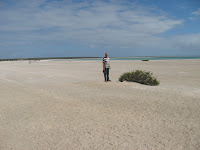We travelled north on the Coastal Highway, back over the 26th Parallel (we were back in the North West), and then west again on the Shark Bay Road which was the start of the World Heritage Drive. Over the next 3 days we thoroughly enjoyed exploring all of the significant sites on this drive.
Hamelin Pool Stromatolites
Shark Bay is one of only two places in the world where living marine stromatolites exist. The living fossils contain microbes similar to those found in 3,500million year old rocks - the earliest record of life on earth. We stayed next to the historic Telegraph Station which was a link in the line from Wyndham to Perth, and also linked with the overseas line at Broome. The walk to the stromatolites took us past a quarry where large blocks of cemented shells were mined.
Next morning we made a return visit to the beach and stomatolites before breakfast and at 9,00am set off for Denham. along the way we called in to Shell Beach. A beach made up entirely of tiny shells from animals known as Hamelin Cockles. The discarded shells have heaped into piles up to 10m thick and in some places the beach is 1km wide. The shells are mined for shell grit and paving material.
Eagle Bluff was our next stop with a boardwalk around the top of a dune that overlooks shallow water and meadows of sea grass. We saw a couple of turtles swimming and many cormorants on the 2 rocky islands.
We arrived in Demham, a quite lovely holiday town, for lunch then caught up with domestic jobs. Later in the day we rode along the waterfront and spent an hour in World Heritage Discovery Centre. The Centre includes an excellent museum which covers all aspects of the Shark Bay District. Our entry entitled us to a revisit the following day.
Next morning was a 9.00am start at the Ocean Park Aquarium where our tour guide was a marine biologist. He was able to explain the habits and defence mechanisms of a variety of marine creatures. Highlights were the squid and seeing how they change colour as a defence mechanism and as a means of communication; the stone fish and the speed with which they take in any prey that swims past their noses; the lion fish with their poisonous feathery fins; and the cleaner fish who hold cleaner stations for large fish to come to - a bit like a car wash. After all this and also watching the sharks being fed, Merilyn says she is never going into the sea for a swim again - she'll stick to Huddart's pool.
First stop on our afternoon drive was at Little Lagoon and a walk along the bank of the clear water creek that connects the lagoon with the sea. Almost perfectly circular in shape Little Lagoon was once a land locked gypsum pan that was inundated by the sea several thousand years ago.The pristine waterway is a natural nursery for several fish species.
 |
| Shark Bay World Heritage Discovery Centre |
Next morning was a 9.00am start at the Ocean Park Aquarium where our tour guide was a marine biologist. He was able to explain the habits and defence mechanisms of a variety of marine creatures. Highlights were the squid and seeing how they change colour as a defence mechanism and as a means of communication; the stone fish and the speed with which they take in any prey that swims past their noses; the lion fish with their poisonous feathery fins; and the cleaner fish who hold cleaner stations for large fish to come to - a bit like a car wash. After all this and also watching the sharks being fed, Merilyn says she is never going into the sea for a swim again - she'll stick to Huddart's pool.
First stop on our afternoon drive was at Little Lagoon and a walk along the bank of the clear water creek that connects the lagoon with the sea. Almost perfectly circular in shape Little Lagoon was once a land locked gypsum pan that was inundated by the sea several thousand years ago.The pristine waterway is a natural nursery for several fish species.
Then on to Peron Homestead Historic Precinct and a walk around the shearing sheds and associated yards and buildings.
After three days we are moving on but feel that we might come back one day. There is still much to discover and it is a very lovely place. A flight over Dirk Hartog Island and a catamaran trip from Monkey Mia are both appealing.
















Bruce and Merilyn, Hey there, my name is Aleisha, I work for the Shire of Shark Bay. At the moment a project has been conducted at the Shark Bay World Heritage Discovery Centre to create activity posters for our newly installed window displays. Lately we've been collecting our best photo images of tourists enjoying the bay. Unfortunately we only have a small collection of photos that we can consider great to be displayed. In an effort to find more photos I hit the web, knowing that there would surely be some tourists that have documented their stay in the area, and in effect, taken some great photos. I came across your blog and really likened to the photo of one of yourselves at the Shell Quarry. I'm wondering if you would consider allowing us to place your photo in one of our frames to promote the Shell Blocks. (I can't promise that the photo will be used). If you could please respond at your earliest convenience. You can reach me via my email - record@sharkbay.wa.gov.au. If you decide against it, we would more than understand. Regards, Aleisha.
ReplyDelete